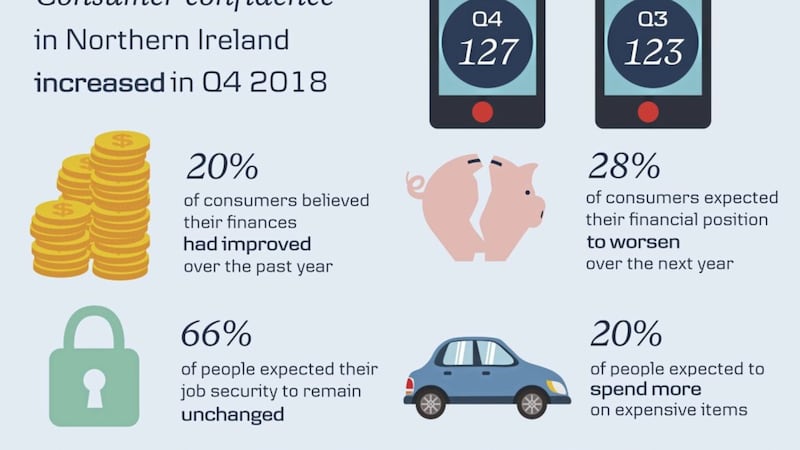CONSUMER confidence in the north picked up at the end of 2018 in spite of the ongoing political uncertainty.
The latest Danske Bank index rose to 127 in the final three months of the year, up from the 123 recorded in the previous quarter and at the end of 2017.
The confidence levels, however remain below those recorded in the first half of 2018 and throughout the majority of the period from 2014 to 2017.
The continued lack of a Stormont Executive and Brexit uncertainty continues to weight heavily on people's minds, according to the analysis.
Danske Bank chief economist, Conor Lambe said:
"Almost 40 per cent of people told us that political uncertainty and the continued absence of a Northern Ireland Executive had the largest negative impact on how they were feeling.
"In addition, 17 per cent of respondents said that developments during the Brexit negotiations in recent months negatively impacted them and a further 12 per cent pointed to the UK Government’s longer-term Brexit objectives as the factor that had the largest negative impact on confidence levels."
Explaining the jump in confidence at the end of the year, Mr Lambe highlighted an increase in people's pay packets as a key factor.
"Almost a quarter of people highlighted rising wages as the factor that had the biggest positive impact on their confidence levels. Consumers also pointed to low interest rates and increasing house prices as other factors impacting them positively," he said.
The figures further revealed an improvement in the financial position of consumers, compared to both last year and the previous quarter.
A total of 20 per cent of those surveyed felt their financial position had improved over the past twelve months, while 28 per cent felt it had deteriorated.
Looking at the year ahead one in five (19 per cent) expects their finances to improve in the next 12 months, while 28 per cent expects their financial position to deteriorate. This is a slight improvement on the previous quarter and was driven by the optimism of youth (those aged 16-34).
There was a rise recorded in the part of the index that looks at job security, while the amount consumers expect to spend on high-value items over the next twelve months increased over the quarter, but fell over the year.
Savings expectations fell over the quarter, but increased over the year.





